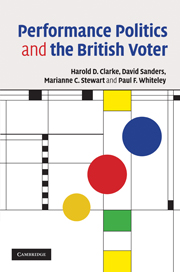Book contents
- Frontmatter
- Contents
- List of figures
- List of tables
- Acknowledgments
- 1 Performance politics and the British voter
- 2 The theory of valence politics
- 3 Valence politics and the long campaign
- 4 Tony's war
- 5 Electoral choices
- 6 The short campaign
- 7 Voting and political participation
- 8 Performance, people and the political system
- 9 Performance politics reconsidered
- Appendix A Vote in 2005 by socio-demographic characteristics
- Appendix B Turnout by socio-demographic characteristics
- Appendix C Dynamics of party identification
- Notes
- Bibliography
- Index
4 - Tony's war
Published online by Cambridge University Press: 06 January 2010
- Frontmatter
- Contents
- List of figures
- List of tables
- Acknowledgments
- 1 Performance politics and the British voter
- 2 The theory of valence politics
- 3 Valence politics and the long campaign
- 4 Tony's war
- 5 Electoral choices
- 6 The short campaign
- 7 Voting and political participation
- 8 Performance, people and the political system
- 9 Performance politics reconsidered
- Appendix A Vote in 2005 by socio-demographic characteristics
- Appendix B Turnout by socio-demographic characteristics
- Appendix C Dynamics of party identification
- Notes
- Bibliography
- Index
Summary
Speaking before parliament in November 1945, British Foreign Minister Ernest Bevin claimed that: ‘the common man is the greatest protection against war’ (Holsti, 1996: 4). Although Bevin was neither the first nor the last to advance this claim — it has been a perennial topic of debate among students of international relations — in fact, ordinary citizens are not invariably united in their opposition to war. When the possibility of engaging in military conflict is salient on the political agenda, it often has positional rather than valence characteristics. Public opinion is divided, sometimes deeply. However, it also is clear that attitudes towards a war can shift, sometimes dramatically, with the typical pattern being for enthusiasm to wane as costs escalate, casualties mount, and ‘light at the end of the tunnel’ fades to black. What had been a position issue becomes a valence one. These stylized facts aside, much remains to be learned about factors that drive public reactions to international conflicts, and how these reactions affect the dynamics of support for political parties and their leaders. In this chapter we address these topics by analysing British public opinion about the Iraq War.
The war was hotly debated for several months before it began on 20 March 2003, and those debates continued afterward. Indeed, British involvement in Iraq was a topic of controversy throughout the remainder of Tony Blair's tenure as prime minister and beyond. When first advanced, the proposal to invade Iraq split the Labour Party, and the decision to go forward ultimately required a bipartisan parliamentary coalition of Conservatives and a majority of Labour MPs loyal to the prime minister.
- Type
- Chapter
- Information
- Performance Politics and the British Voter , pp. 103 - 142Publisher: Cambridge University PressPrint publication year: 2009



